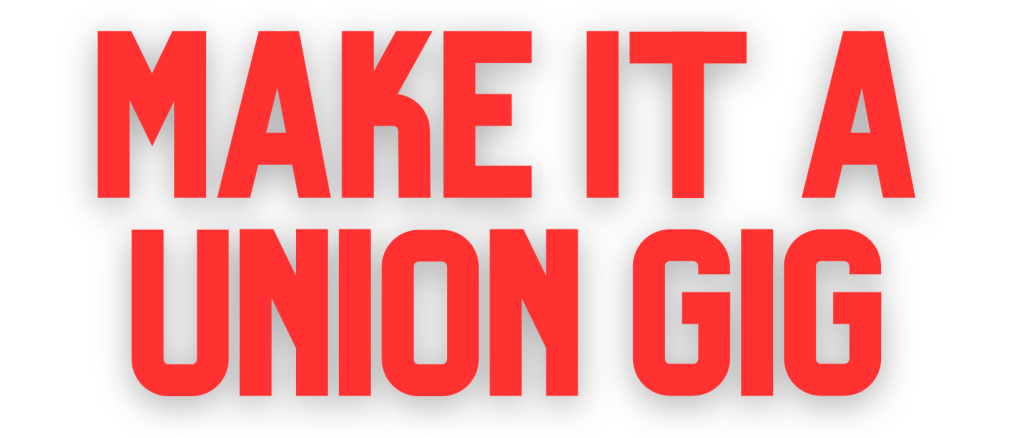
MAKE IT A UNION GIG
As a musicians union we represent so many different kinds of musicians and music, performing in different venues, different styles…. and working so many different kinds of gigs. We play gigs in churches, clubs, concert halls, hotels, private parties, community centers, and the list goes on. So with all this to work that we do, one might ask, which of these gigs are UNION gigs?
We just completed another successful Denton Arts & Jazz Festival this month. Over three days, sixty of our union bands gave performances at the festival through the sponsorship of Music Performance Trust Fund (MPTF). In this case the AFM negotiated funding from the recording industry for MPTF to pay wages for these free community live music performances, paying Union scale. These were union gigs.
Like other labor unions we collectively bargain with employers. We do this under the laws of the National Labor Relations Act. Our rights under federal law empower us to come together, elect representatives, and collectively bargain for orchestra and theater musicians, and any other group whose members are legally classified as employees. These are union gigs.
Throughout our area, band leaders and contractors book gigs for any number of kinds of venues and clients using contracts that adhere to standards put forward by our union, using scales and working conditions for which we as a union advocate. These contracts provide an avenue for protection with the aid of union resources to the musicians and a level of professionalism to the gig. These are union gigs too.
And when any one of us accepts a gig to perform alongside our fellow union musicians, with an agreement that we will be paid at or above our local’s wage scales and working conditions, these also are union gigs.
In fact, any gig where we apply our rules, work together in some way to make the gig better, and treat each other’s interest as our own, is a gig where we are taking action to improve our power and conditions, and therefore, is a union gig.
Granted, there was a time when we had more power over freelance gigs. Decades ago, we influence over the wages and conditions for gigs in clubs and hotels industrywide that we no longer have. Once upon a time, the AFM was able to require its signatory booking agents to book only Union bands for the clubs, and the musicians hired were classified as employees of those clubs. The clubs had no choice but to use these agents for booking if they wanted the best talent, and the musicians were booked at union scales with union terms and conditions, and hired with specifically Union contracts. Union musicians were protected. Clearly union gigs.
But then a terrible chain of events occurred. A group of frustrated band leaders seeking more power and money hired union busting lawyers and set off an avalanche of legal attacks against their own AFM locals across the nation. Long story short: court-imposed settlements gutted the protections of this AFM Booking Agent Agreement. And worse, musicians at clubs and hotels who had enjoyed the rights and legal protections of being classified as employees were then (and have been ever since) legally reclassified as independent contractors, taking from them many protections and rights to unionize. As a result legal impediments were removed for agents and the clubs to exploit and drive labor standards into the ground.
This tragic chapter in our history truly undermined the methods we had depended upon to organize good union gigs and protect musicians. It is a BIG DEAL that our club musicians lost employee status, as it robbed us of basic rights that other workers take for granted. Recently, a group of workers in southern California used those rights to become the only one of their kind to unionize in the US. These workers were a group of exotic dancers working in a dive bar in North Hollywood, California. Fed up with poor pay and unsafe working conditions, they decided they wanted to form a union, and after a year and a half of fighting legal opposition from the bar, they successfully were able to organize as members of Actors’ Equity Association. They now are proudly working under a union agreement.
It was inspiring to learn about these individuals coming together to address their workplace problems in what is surely an industry rife with abuse. But this story also makes apparent a bitter reality for us: if we musicians were working in that same bar, we would not have the same rights to unionize under the law that these dancers heroically fought for and won. It not only illustrates the damage done to us by the disastrous change in classification from employee to independent contractor decades ago, but it also highlights how unfair and arbitrary it is.
It also is this tragic circumstance behind many people’s misapprehension that club gigs are not union gigs. While our legal rights to empower us as a union have been diminished, we can still use our collective strength to effect change in these workplaces.
One way is by taking our fight to the ballot box. In the last two previous Congresses, the Protecting the Right to Organize Act (or PRO Act) was introduced and passed with bipartisan support in the House of Representatives, and has been introduced again in this year’s Congress. Designed to “repair” the much damaged National Labor Relations Act, if passed into law, this legislation would among many other things enable independent contractors the right to collectively bargain, going far to reverse our setbacks suffered decades ago. And due to the rise of the “new” gig economy we now have allies (potentially in the hundreds of millions) who will join and stand with us. Change that perhaps seemed impossible some years ago has gained persistent congressional advocacy and increasingly broad public support. It is time for each of us to assess our own Congressional Representatives and hold them to the task of supporting our interests.
In the meantime, we continue to play our gigs blazing our paths as professional musicians. And we will organize ourselves to address the issues with the resources and tools we have to make our workplaces better. I will be following this column with further discussions of ways to do just that, and we will be developing new plans for move us forward. At the end of the day, what we come together to do is focus ON OUR GIGS, as they form the glue that defines our businesses and lives. I look forward to the path in front of us as we do this together.

